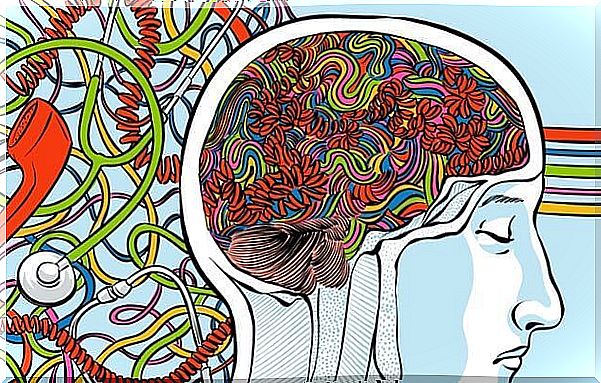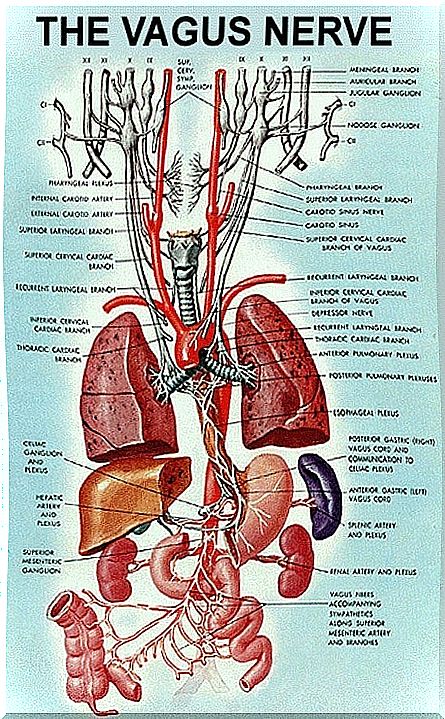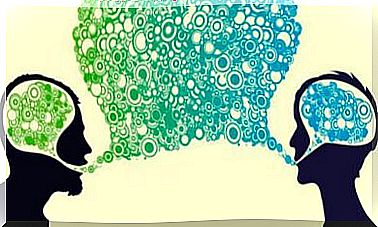The Fantastic Vagus Nerve Can Remove Anxiety

The vagus nerve interacts with so many different parts of the body, to the extent that many define this as our body’s driving force, an internal channel that regulates rest and which also deactivates signs of anxiety in our body. Knowing how to stimulate the vagus nerve to remove anxiety through exercises such as breathing with the diaphragm will undoubtedly help us reduce many of the negative emotions that affect us daily.
Think for a moment about all the situations that create anxiety, about everything that produces fear and discomfort… If we examine these occasions, we will see how our stomach and our intestines sometimes start to suffer from spasms and cramps, and it feels like hundreds of angry butterflies fluttered around inside us. This feeling is picked up directly by the vagus nerve and sends a clear message to the brain: “We have a threat”.
Professor Wolfgang Langhans at ETH Zurich and his team discovered a few years ago that this fascinating nerve is closely linked to our emotions, especially fear or the need to escape. They showed, for example, that people suffering from chronic anxiety have a hypersensitivity in this nerve.
Much of our body loses its balance when we get anxiety: the heart accelerates, digestion becomes more difficult and we suffer from diarrhea. However, one way we can regulate this negative impact on our emotions is to “activate” the vagus nerve properly. Although the nerve automatically responds to different situations in the body, it is possible to stimulate or strengthen it to promote a feeling of relaxation and remove anxiety.

In 1921, the German Nobel laureate Otto Loewl discovered that a very interesting effect was obtained by stimulating the vagus nerve: the heart rhythm was reduced and a very special substance was excreted in the body. He called this substance “Vagusstoff” (which in German means “vagus substance”). This “vagus substance” was actually a very specific neurotransmitter – acetylcholine – and was the first neurotransmitter identified by scientists.
Acetylcholine is one of the most important chemicals in the body because it allows nerve impulses to be sent out. The vagus nerve, on the other hand, has an equally important role: it acts as a driving force for the parasympathetic nervous system and regulates our reactions in connection with rest, digestion, the need to escape or relaxation.
It is in a way a game of power where prosperity is at the center of the homeostatic balance.

Clinical psychologists like Kyle Bourassa at the University of Arizona explain that something as basic as promoting a healthy connection of the vagus nerve between the intestines and the brain could be very helpful. For example, it would have helped our bodies to better regulate the production of neurotransmitters such as acetylcholine or GABA. Thanks to these neurotransmitters, we will be able to reduce our heart rate, our blood pressure and slow down the activity of organs that have become overactivated due to anxiety. Two of the benefits of this will be better sleep and better digestion.
We will now take a deeper look at how we put this into practice.
There are some people who can stimulate the vagus nerve to remove anxiety with the help of a physiotherapist who specializes in this area. A special massage is performed at the abdominal area which activates the vagus nerve to produce a feeling of calm and thus relieve spasms in the organs that have been affected by your anxiety.
However, there is another method that we can perform ourselves to remove anxiety. We achieve this by breathing with the diaphragm. It is a good strategy for relaxation, and if you exercise it daily, you will also feel less threatened, have better digestion, better internal balance and a more restorative rest. There are also many other strategies, which together with a deep or diaphragmatic breathing can be very helpful:
- Moderate aerobic exercise daily
- Positive and enriching social contacts
- Meditation
- Keep a diary to get to know ourselves better
- Probiotics – a good intestinal flora results in better brain health
- Cold showers for a few seconds
- Yoga
- Sleep on the left side
- To laugh often
- Increase our levels of serotonin and oxytocin

As we can see in the list above, there is one aspect that should definitely catch our attention. The simple fact that things like positive emotions, a good social life, leisure, laughter and relaxation stimulate our vagus nerve and are of great benefit to our bodies.
We should not forget that it is in the intestines that between 80 to 90% of our serotonin is produced. Serotonin is known as the “happiness hormone”. We should also not overlook that by having a smile on our face, dancing, walking, swimming, etc. we can achieve very positive metabolic changes. Changes such as the fantastic vagus nerve, which connects to so many parts of the body, receive immediately and send a very specific message to our brains: “Everything is going well, everything is calm!”.









